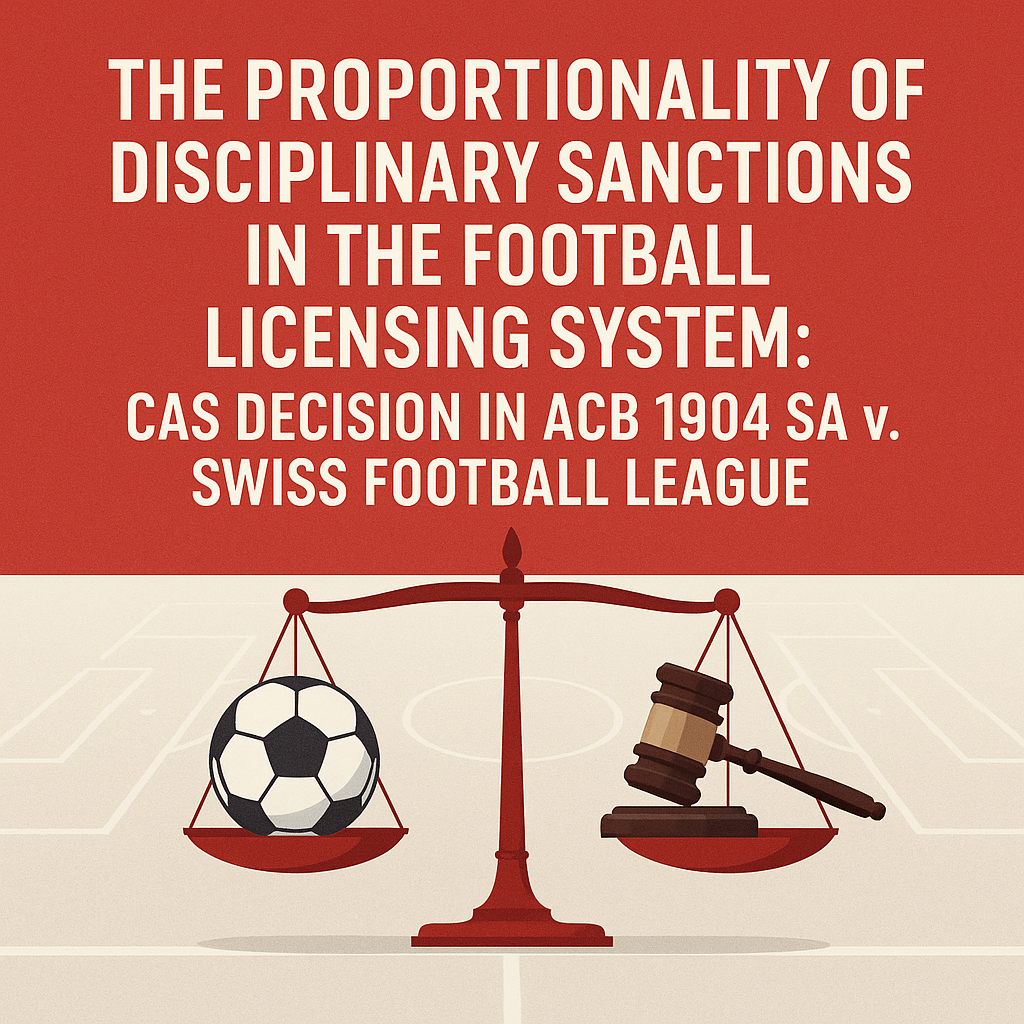THE PROPORTIONALITY OF DISCIPLINARY SANCTIONS IN THE FOOTBALL LICENSING SYSTEM: CAS DECISION IN ACB 1904 SA v. SWISS FOOTBALL LEAGUE

In the context of sports justice, the proper application of the principle of proportionality constitutes an indispensable cornerstone in the imposition of disciplinary sanctions.
The recent decision rendered by the Sole Arbitrator in the appeal proceedings brought before the Court of Arbitration for Sport (CAS) by Associazione Calcio Bellinzona (ACB) against the decision of the Appeals Tribunal of the Swiss Football League (SFL) (CAS 2024/A/11189) provides an opportunity to reflect on the balance between formal legality and substantive assessment of regulatory conduct—particularly in relation to documentary compliance within licensing procedures.
The case concerns the alleged breach by ACB of the duty of disclosure set out in Article 8(5) of the SFL Licensing Regulations (the Regulations). Specifically, ACB submitted, with a delay, the confirmation issued by AXA Insurance attesting to the receipt of payment of the advance instalment for LAINF contributions (Federal Act on Accident Insurance). As a result of this formal breach, the Appeals Tribunal had applied the sanction automatically provided for in Article 26(3) of the Regulations, that is, a deduction of three points from the league standings.
This decision stands out for its significant shift in interpretative approach: whilst affirming the occurrence of the breach, it reforms the challenged decision insofar as it relates to the sanction imposed, advancing an interpretation of the disciplinary framework that is aligned with the general principles of sports law, in particular, the principle of proportionality.
The regulatory framework: disclosure obligations and the sanctioning system under the Regulations
The Regulations constitute a regulatory corpus designed to ensure the transparency and economic-administrative sustainability of professional clubs. Article 8(5) imposes a general obligation on clubs to provide documentation that is accurate, complete, and submitted within the prescribed deadlines. Compliance with such obligations is essential to maintain competitive fairness and uphold the credibility of the system.
Article 26(3) of the Regulations provides that, in the event of a breach of Article 8(5), a minimum sanction may be imposed, including the deduction of league points. The literal wording of the provision has given rise, in practice, to an automatic and rigid interpretation of the sanction, often applied without qualitative assessment of the actual offending conduct.
However, such a strict construction is difficult to reconcile with the general principles of sports law—including proportionality, culpability, and individualisation of sanctions—which are widely recognised in the CAS jurisprudence and have also been incorporated into domestic practice.
The proceedings and the parties’ positions
In the present case, ACB submitted the confirmation of receipt of the LAINF payment by AXA Insurance after the deadline established in the Regulations. However, the documentation was accurate and complete, and the breach was merely temporal in nature.
The Appeals Tribunal, whilst acknowledging the absence of any fraudulent intent or evasive purpose, applied the minimum sanction, considering it to be automatically imposed by the Regulations. ACB lodged an appeal, challenging both the existence of a breach and, in the alternative, the proportionality of the sanction imposed.
In a reasoned decision, the CAS confirmed the existence of a breach of Article 8(5) of the Regulations, as the AXA confirmation was indeed submitted late. Nevertheless, it held that the sanction provided for in Article 26(3) should not be applied in a mechanical or generalised manner but instead must be subject to assessment in light of the principles of proportionality and individualisation of disciplinary measures.
In support of its decision, the CAS referred to the well-established principle in sports disciplinary matters that a sanction must be proportionate to the gravity of the conduct, taking into account both subjective and objective elements. A purely formal violation, absent intent, recurrence, or concrete prejudicial effects on the licensing system, does not justify the automatic imposition of a sanction as severe as a points deduction.
Amongst the mitigating circumstances considered, the Sole Arbitrator placed particular importance on the following:
- the absence of fraudulent intent by the appellant club;
- the substantive correctness and completeness of the documentation submitted;
- the ACB cooperative and transparent conduct during the proceedings;
- the lack of any negative repercussions on the regular conduct of the championship.
The sanction imposed: a balanced interpretation of disciplinary power
On the basis of this balancing exercise, the CAS partially upheld the appeal and amended the challenged decision by replacing the three-point deduction with a pecuniary fine of Sw.Frs. 30,000. This measure was deemed appropriate and consistent with the objectives of the sanctioning framework, without being disproportionate to the actual seriousness of the infraction and also taking into account that ACB had previously missed a filing deadline.
This decision represents an important reaffirmation of the discretionary role of the sports adjudicator, who cannot be bound by automatic sanctioning mechanisms in the absence of specific and non-derogable provisions. It confirms the importance of a case-by-case approach, grounded in the factual matrix and the general principles of law.
The ACB case marks a significant precedent in the internal jurisprudence of the Swiss Football League, reaffirming the duty of sports decision-making bodies to exercise their disciplinary powers with methodological rigour, avoiding mechanical application of regulatory provisions.
More broadly, the CAS decision contributes to reinforcing the consistency of the sports disciplinary system with fundamental principles of law—particularly the principle of proportionality, understood not only as a standard of constitutional legality but also as a criterion of substantive justice and legitimate expectation for stakeholders in the sector.
For practitioners in sports law, this case constitutes a precedent worthy of close attention and further analysis, especially regarding its potential implications for the future interpretation of regulatory provisions and the educational function of the disciplinary system.
This case also illustrates the need for sports clubs to take seriously and adhere strictly to sporting deadlines.
We act in football disputes of all kinds in Switzerland and further information is available from Dr Lucien Valloni and Avv. Sara Botti by emailing them at valloni@valloni.ch and botti@valloni.ch respectively.